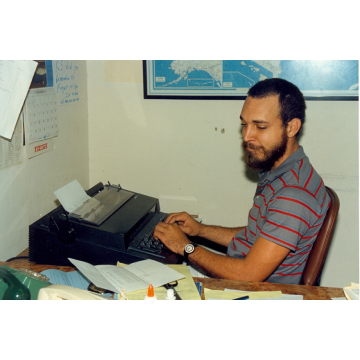News
Stronger Stakeholder Relationships a Focus on CFATF Progress
Working relationships between local public and private sector agencies combatting money laundering and terrorist financing are growing stronger, thanks to ongoing work by National Coordinator for the Anti-Money Laundering Steering Group (AMLSG) Elisabeth Lees.
Appointed to co-ordinate the Cayman Islands response to recent recommendations by the Caribbean Financial Action Task Force (CFATF) to improve the local AML/CFT regime, Ms Lees has spent the last few months working, along with the Anti-Money Laundering Unit to coordinate the actions taken by the public sector to implement the recommendations in the report and to facilitate outreach to the private sector.
In a report published in March 2019, the CFATF, the regional body set up to evaluate a country’s measures to combat money laundering, terrorism financing and proliferation financing, said the country needs to improve the local AML/CFT regime in several areas, including increasing its understanding of the risks in the jurisdiction and ensuring all entities that conduct relevant financial business implement robust AML/CFT measures. The Cayman Islands has until February 2020 to demonstrate to the global standard setter, the Financial Action Task Force, that it has made positive and tangible progress in implementing the recommendations of the report. Failure to do so could result in the FATF imposing a remediation plan on the Cayman Islands, and the jurisdiction being placed on the compliance document.
Successful implementation of the CFATF recommendations, explains Premier, Hon. Alden McLaughlin, requires continuous stakeholder engagement by the local public sector and industry.
Commenting on Ms Lees’ appoint and expertise and years of commitment to the fight against money laundering/financing of terrorism, the Premier noted: “The Cayman Islands has always worked hard to stay abreast of global regulatory measures. With this role and others around the public service that focus on increased coordination and improved communication within our local financial and commercial sectors as part of this process, we are taking positive steps towards implementing the report’s recommendations”.
At a recent meeting of relevant public and private sector organisations, the Premier specifically reiterated the need for all agencies to work together on behalf of the country to successfully implement the CFATF recommendations and improve the Cayman Islands AML/CFT framework as a matter of national priority.
All public sector bodies involved in the CFATF response have begun making amendments to their processes and procedures to meet the February 2020 deadline, to ensure enhanced coordination and cooperation in relation to the jurisdictions’ AML / CFT regime. Self-Regulatory Bodies are also included in the coordination efforts and discussions with private stakeholders have included meetings with groups like the Cayman Islands Compliance Association.
The National Coordinator is one of over 100 positions with roles to play in the AML/CFT fight that have been created with funding allocated over the next few years. These positions were distributed between agencies such as the Royal Cayman Islands Police Service, Customs and Border Control, the Financial Reporting Authority and the Cayman Islands Monetary Authority among others.
A new working group that concentrates on fighting proliferation financing, or the financing of weapons of mass destruction, an area of focus in the CFATF report, has also been established. The working group seeks to better understand and mitigate proliferation finance risk in the Cayman Islands. Members include representatives from the ODPP, CIMA, the Financial Reporting Authority, the Shipping Registry and the Department of Commerce and Investment as well as the Anti-Money Laundering Unit.
In addition to building local partnerships, Ms Lees notes that the Cayman Islands has continued to work closely with the CFATF. On 22 and 23 May, Cayman hosted the CFATF’s Deputy Executive Director, Carlos Acosta, who met with each agency to discuss progress, answered queries and made suggestions. Later that month, a delegation from the Cayman Islands, headed by the Attorney General, attended the CFATF Plenary, ensuring active participation and providing another opportunity to liaise closely with the Secretariat. The Cayman Islands was also represented at the Financial Action Task Force (FATF) Plenary in February and June.
Ms Lees took up the National Coordinator role earlier this year, following several years as Senior Crown Counsel, in the Office of the Director of Public Prosecutions (ODPP). In this position she was responsible for incoming and outgoing international requests for assistance, specialising in CFATF matters. Furthermore, Justine Plenkiewicz has taken up her appointment as Deputy National Coordinator, with responsibility for coordinating the work of supervisory agencies.
Progress that Cayman has made to date towards addressing the recommendations in the CFATF report also includes:
- The Hon. Premier chairs a newly created Cabinet Subcommittee, which is to ensure sustained commitment to AML/CFT/PF at the highest levels of Government. In addition to the Hon. Premier and Hon. Attorney General, members are the Ministers of Financial Services, Finance, and Commerce; and the Deputy Governor. The Committee meets on a monthly basis, to assess the progress being made by the relevant agencies.
- The Legal Associations (Miscellaneous Amendments) Law came into effect on 19 February 2019, to recognise the Cayman Islands Legal Practitioners Association (CILPA) as the self-regulatory body for the supervision of lawyers. CILPA has delegated supervisory functions to CARA (Cayman Attorneys Regulatory Authority), which has begun to build its regulatory oversight framework, which will include the registration of law firms for AML purposes.
- In April 2019 the Legislative Assembly approved supplementary appropriations directly related to AML/CFT/PF, for different agencies to acquire the necessary human and IT resources, to address the recommended actions identified in the report.
- On 11 and 12 June, Mr James Hines, QC, held an anti-money laundering seminar for investigators, prosecutors and other relevant agencies. Mr Hines QC spent over two months in the jurisdiction assisting with the interim International Money Laundering and Terrorist Financing Investigative Unit of the RCIPS pending the recruitment of a dedicated Crown Counsel I (Financial Crime) to assist in the development of financial crime investigations into prosecutions. Mr Hines previously served as both prosecution and defence counsel in cases involving the UK’s Serious Fraud Office; Financial Conduct Authority, and Competition and Markets Authority.
- During the week of 1 July, work was begun by various working groups on updating risk assessments to ensure that the jurisdiction examines and understands its risks and takes appropriate measures. This is being co-ordinated by the AMLU. Assistance is being provided by Financial Transparency Advisors and consultants who have been contracted by the Ministry of Financial Services.
- The Office of the Director of Public Prosecutions (ODPP) organised training for relevant agencies on terrorist financing investigations and prosecutions, led by an investigator with experience in the field and is a dedicated terrorist financing prosecutor from the Crown Prosecution Service in the UK.
- From 22-25 July, the Financial Reporting Authority (FRA) brought together Government departments, authorities, industry bodies and an expert from the UK Treasury for a series of public- and private-sector meetings on targeted financial sanctions.
Individuals with questions or who require specific information about the CFATF response should email their supervisor or AMLU@gov.ky. Updates on progress towards full implementation of the action plan will be issued through local media outlets and posted on the AMLU website.












